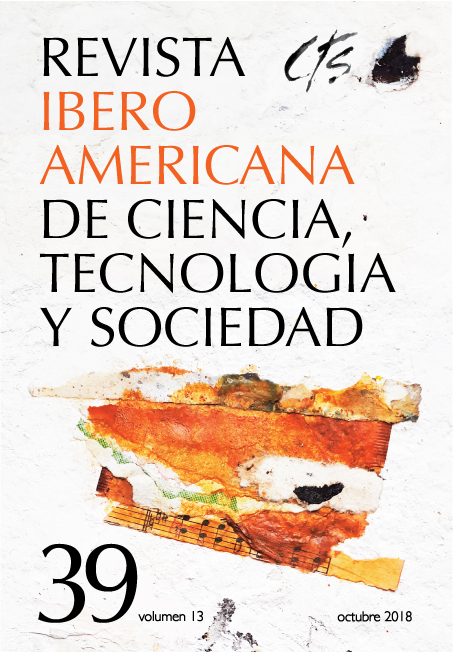Knowledge Typologies: A Critical Review and a Materialistic Approach
Keywords:
knowledge, typology, knowledge economy, cognitive materialismAbstract
This paper reviews and systematizes some of the most relevant typologies when it comes to knowledge. It points out their limitations and presents an alternative that stems from our theoretical perspective: cognitive materialism. In this way, traversing a somewhat arbitrary path through the economy of innovation and management, the typologizations of Lundvall, Machlup, Mokyr, Spender, Blackler and Chartrand are critiqued. Then, taking-up the elements born from the previous analysis, the cognitive materialism approach is briefly introduced, based on identifying knowledge classes according to the support materials in which they exist. Therefore, a division in four types is proposed: knowledge of biological supports, subjective, inter-subjective and objective; each one with their respective subtypes.Downloads
References
ANCORI, B., BURETH, A. y COHENDET, P. (2000): “The Economics of Knowledge: The Debate about Codification and Tacit Knowledge”, Industrial and Corporate Change, vol. 9, n° 2, pp. 255-283.
BATESON, G. (1972): Steps to an Ecology of Mind, Nueva York, Ballantine Books.
BLACKLER, F. (1995): “Knowledge, knowledge work and organizations: an overview and interpretation”, Organization Studies, vol 16, n° 6, pp. 1021-1046.
CHARTRAND, H. (2007): The Competitiveness of Nations in a Global Knowledge Based Economy. Ideological Evolution, La Vergne, VDM Verlag Dr. Mulle.
COLLINS, H. (2010): Tacit and Explicit Knowledge, Chicago, University of Chicago Press.
CORNES, R. y SANDLER, T. (1996): The theory of externalities, public goods, and club goods, Cambridge, Cambridge University Press.
COWAN, R., DAVID, P. y FORAY, D. (2000): “The Explicit Economics of Knowledge Codification and Tacitness”, Industrial and Corporate Change, vol. 9, nº 2.
DURKHEIM, E. (1993 [1893]): La División del Trabajo Social, Buenos Aires, Planeta Agostini.
DURKHEIM, E. (1986 [1895]): Las reglas del método sociológico, Buenos Aires, Hispamérica.
FORAY, D. y LUNDVALL, B. (1996): “The knowledge-based economy: From the economics of knowledge to the learning economy”, Employment and growth in the knowledge-based economy, París, OCDE.
FOUCAULT, M. (1989): Las palabras y las cosas, México DF, Siglo XXI.
GIULIANI, E. (2002): ¨Cluster absorptive capability: an evolutionary approach for industrial clusters in developing countries¨, DRUID Summer Conference on Ïndustrial Dynamics of the New and Old Economy- Who is embracing whom?, Copenhage, Elsinore.
JAMES, W. (2007 [1890]): The Principles of Psychology, Nueva York, Cossimo Classics.
KANDEL, E (2006): In Search of Memory: The Emergence of a New Science of Mind, Nueva York, W. W. Norton.
KUZNETS, S. (1965): Economic Growth and Structure, Nueva York, W.W. Norton.
LUNDVALL, B. (2000): “From the Economics of Knowledge to the Learning Economy”, Knowledge management in the learning society, París, OECD.
LUNDVALL, B. y JOHNSON, B. (1994), “The learning economy”, Journal of Industry Studies, vol. 1, n° 2, pp. 23-42.
MACHLUP, F. (1962): The Production and Distribution of Knowledge in the United States, Princeton, Princeton University Press.
MOKYR, J. (2002): The Gifts of Athena: Historical Origins of the Knowledge Economy, Princeton, Princeton University Press.
NELSON, R. (2003): “On the Uneven Evolution of Human Know-How”, LEM Papers Series 2003/25, Laboratory of Economics and Management (LEM), Sant’Anna School of Advanced Studies, Pisa.
NELSON, R. y NELSON, K. (2002): “On the nature and evolution of human knowhow”, Research Policy, vol. 31, pp. 719–733.
NELSON, R. y WINTER, S. (1982): An Evolutionary Theory of Economic Change, Cambridge, Harvard University Press.
NONAKA, I. y TAKEUCHI, H. (1999): The Knowledge Creating Company: How Japanese Companies Create the Dynamics of Innovation, Oxford, Oxford University Press.
OSTROM, V. y OSTROM, E. (1977), “Public Goods and Public Choices,” en E. S. Savas (ed.): Alternatives for Delivering Public Services: Toward Improved Performance, Boulder, Westview Press, pp. 7–49.
OSTROM, E. y HESS, C. (2006): “Introduction: An overview of the knowledge commons”, Understanding Knowledge as a Commons: From Theory to Practice, Cambridge, The MIT Press.
POLANYI, M. (1958): Personal Knowledge: Towards a Post-Critical Philosophy, Chicago, University of Chicago Press.
POLANYI, M. (1967): The Tacit Dimension, Nueva York, Doubleday.
ROMER, P. (1993): “Two strategies for economic development: using ideas and producing ideas”, Proceedings of the world Bank: annual conference on development economies, World Bank, Washington DC.
RYLE, G. (1949): The Concept of Mind, Chicago, The University of Chicago Press.
SCHACTER, D. (1987): “Implicit memory: History and current status”, Journal of Experimental Psychology: Learning, memory and cognition, vol. 13, pp. 501-518.
SCHELER, M. (1980 [1926]): Problems of a Sociology of Knowledge, Londres, Routledge and Kegan Paul.
SPENDER, J. (1996): “Making Knowledge the Basis of a Dynamic Theory of the Firm”, Strategic Management Journal, vol. 17, pp. 45-62.
STIGLITZ, J. (1999): ¨Knowledge as a global public good¨ en Inge Kaul et al. (comps.): Global public goods: International cooperation in the 21st. Century, Nueva York, Oxford University Press.
YOGUEL, G. y FUCHS, M. (2003): “Desarrollo de redes de conocimiento; Estudio 1.EG.33.3; Componente D; Préstamo BID 925 / OC-AR. Pre II”, a solicitud de la Secretaría de Política Económica Coordinación del Estudio: Oficina de la CEPAL/ONU en Buenos Aires and Ministerio de Economía de la República Argentina.
Downloads
Published
How to Cite
Issue
Section
License
All CTS's issues and academic articles are under a CC-BY license.
Since 2007, CTS has provided open and free access to all its contents, including the complete archive of its quarterly edition and the different products presented in its electronic platform. This decision is based on the belief that offering free access to published materials helps to build a greater and better exchange of knowledge.
In turn, for the quarterly edition, CTS allows institutional and thematic repositories, as well as personal web pages, to self-archive articles in their post-print or editorial version, immediately after the publication of the final version of each issue and under the condition that a link to the original source will be incorporated into the self-archive.











